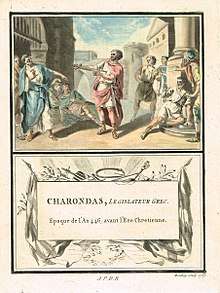Charondas
Charondas (Greek: Χαρώνδας) was a celebrated lawgiver of Catania in Sicily. It is uncertain when he lived; some identify him as a pupil of Pythagoras (c. 580 – 504 BC), but all that can be said is that he lived earlier than Anaxilas of Rhegium (494 – 476 BC), since his laws were in use amongst the Rhegians until they were abolished by that tyrant.[1] His laws, originally written in verse, were adopted by the other Chalcidic colonies in Sicily and Italy.
|
Caronda, Antichissimo legislatore d'Italia, istituiva in questa sua città nel settimo secolo avanti Cristo il primo celebrato ginnasio condotto da uomini liberi a spese dello Stato. Poche leggi dava e molte norme di pubblico e privato costume alla Sicilia e alla Magna Grecia e santificandole con l'esempio meritava gloria immortale qual fondatore austerissimo di civiltà. (Charondas, Very ancient legislator of Italy, established in his city in the 7th century BC the first celebrated gymnasium ruled by free men using State expenses. He gave few laws and many rules about public and private costume both to Sicily and Magna Graecia and sanctifying them through the examples he deserved immortal glory as a most austere founder of Civics.) |
| Epigraph by Mario Rapisardi at the entrance of the Roman Amphitheatre of Catania. |

According to Aristotle there was nothing special about these laws, except that Charondas introduced actions for perjury; but he speaks highly of the precision with which they were drawn up.[2] The story that Charondas killed himself because he entered the public assembly wearing a sword, which was a violation of his own law, is also told of Diocles of Syracuse and Zaleucus.[3] The fragments of laws attributed to him by Stobaeus and Diodorus are of late (Neo-Pythagorean) origin.[4] Charondas is said to have commanded that if the nearest relative of an epikleros (something close to an heiress) did not wish to marry her, he was required to provide a dowry.[5]
Notes
- Peck, Harry Thurston (1898). Harpers Dictionary of Classical Antiquities. Retrieved 4 July 2015.
- Chisholm 1911, p. 948 cites Politics, ii. 12.; Aristotle, Politics. IV, 7.
- Chisholm 1911, p. 948 cites Diod. Sic. xii. 11-19.
- Chisholm 1911, p. 948.
- Lacey 1968, p. 225.
References
- Lacey, W. K. (1968). The Family in Classical Greece. Ithaca, NY: Cornell University Press.CS1 maint: ref=harv (link)
Attribution

- R. Bentley, On Phalaris, which (according to Benedikt Niese s.v. in Pauly, Realencyclopädie) contains what is even now the best account of Charondas
- A. Holm, Geschichte Siciliens, i.
- F. D. Gerlach, Zaleukos, Charondas, und Pythagoras (1858)
